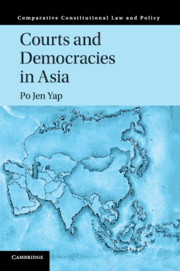Courts and Democracies in Asia Comparative Constitutional Law and Policy Series
Langue : Anglais
Auteur : Yap Po Jen

This book illuminates how law and politics interact in the judicial doctrines and explores how democracy sustains and is sustained by the exercise of judicial power.
What is the relationship between the strength of a country's democracy and the ability of its courts to address deficiencies in the electoral process? Drawing a distinction between democracies that can be characterised as 'dominant-party' (for example Singapore, Malaysia, and Hong Kong), 'dynamic' (for example India, South Korea, and Taiwan), and 'fragile' (for example Thailand, Pakistan ,and Bangladesh), this book explores how democracy sustains and is sustained by the exercise of judicial power. In dominant-party systems, courts can only pursue 'dialogic' pathways to constrain the government's authoritarian tendencies. On the other hand, in dynamic democracies, courts can more successfully innovate and make systemic changes to the electoral system. Finally, in fragile democracies, where a country regularly oscillates between martial law and civilian rule, their courts tend to consistently overreach, and this often facilitates or precipitates a hostile take-over by the armed forces, and lead to the demise of the rule of law.
1. Introduction; Part I. Dominant-Party Democracies: 2. Supreme Court of Singapore and the promise of enforceable constitutional conventions; 3. Malaysian courts and electoral fraud; 4. Hong Kong Courts and constitutional contradictions; Part II. Dynamic Democracies: 5. Supreme Court of India and criminality in politics; 6. Constitutional court of Taiwan and calibrated judicial review; 7. Constitutional court of Korea and systemic electoral barriers; Part III. Fragile Democracies: 8. Constitutional court of Thailand and partisan judges; 9. Supreme Court of Pakistan: accommodation and defiance of military authority; 10. Supreme Court of Bangladesh and defensive judicial review; Part IV. Democratic Values and Courts in Comparative Perspective: 11. Democratic values and the conundrum of unconstitutional constitutional amendments; 12. Conclusion; Bibliography; Index.
Po Jen Yap is an Associate Professor at The University of Hong Kong (HKU), Faculty of Law, where he specialises in comparative constitutional law. He graduated from the National University of Singapore with an LL.B. degree and he obtained LL.M. qualifications from both Harvard Law School and University College London. He also has a Ph.D. degree from the University of Cambridge. He is an Advocate and Solicitor of the Supreme Court of Singapore and an Attorney at Law in the State of New York (USA). His publications include Constitutional Dialogue in Common Law Asia (2015).
Date de parution : 01-2019
Ouvrage de 250 p.
15.3x23 cm
Disponible chez l'éditeur (délai d'approvisionnement : 14 jours).
Prix indicatif 32,87 €
Ajouter au panierDate de parution : 09-2017
Ouvrage de 244 p.
15.6x23.5 cm
Disponible chez l'éditeur (délai d'approvisionnement : 14 jours).
Prix indicatif 127,71 €
Ajouter au panier
© 2024 LAVOISIER S.A.S.



